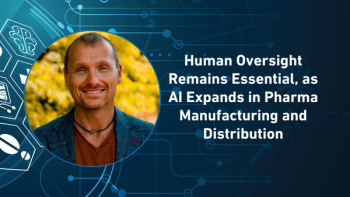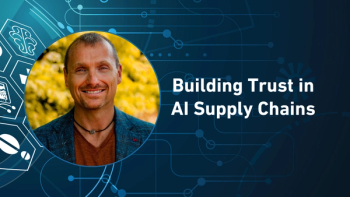
- Pharmaceutical Commerce - June 2023
- Volume 18
- Issue 3
Manufacturing at the Speed of AI
How pharma can harness digitalization all the way through commercialization
According to a recent McKinsey & Company report, artificial intelligence (AI) investment among pharmaceutical companies increased from less than $1 billion in 2015 to over $7 billion in 2021. As is the case with many industries today, the pharma industry is one that has embraced digitalization and investment in advanced technologies to quickly adapt to market needs and optimize manufacturing processes to improve drug access, quality, and safety.
Over the past decade, these investments have contributed to the current phase of industrialization, known as Pharma 4.0, but as these types of investments have become more commonplace among pharma leaders, simply having the capabilities to incorporate AI has become the minimum requirement to staying on top of the next phase of innovation. Industry leaders who are looking to differentiate themselves must now ask, what’s next?
The role of AI throughout the pharma supply chain
AI has proven itself as a key component of optimization across several aspects of the value chain, from drug development through commercialization. This was particularly true and critical to mobilizing the resources needed to develop COVID-19 vaccines. Prior to the pandemic, vaccine development could take as long as
The acceptance and implementation of AI technology has greatly improved the speed and efficiency of
As the role of AI in the pharma supply chain continues to grow, one application that shows promise is in automatic visual inspection. The integration of automatic AI technologies enables pharma companies to detect the slightest particle defects, allowing life-saving drugs to be free of contaminants, while mitigating public safety and
compliance risks.
Making AI work for the masses
With such a wide variety of use cases to tactfully implement AI into the drug product and commercialization process, the industry now has its sights set on the next phase of industrialization. This shift will focus less on direct benefits to pharma companies and instead leverage the power of AI to make a broad, positive impact on society as a whole.
Focused on end patients, one area in which AI can be used to make this type of impact is in the development of more
Another area in which AI can be used to improve pharma industry operations is in relation to quality. Integrating AI helps increase the detection rate of defects, while minimizing the false reject rate that occurs when quality control measures mistakenly reject products. In this way, pharma companies can greatly benefit, but also the final user—that is, the patient.
Overall, the integration of AI in the pharma development, manufacturing, and commercialization process is in its infancy, and there are infinite opportunities for innovators to leverage its impact for the greater good. The groundwork has been laid for pharma companies to differentiate themselves by building on foundational AI capabilities, and those that do will come out victorious in the race to meet demand and evolve with ever-changing patient needs.
About the Author
Riccardo Butta is President of the Americas at Stevanato Group.
Articles in this issue
over 2 years ago
Pharmaceutical Commerce - June 2023 Issue (PDF)over 2 years ago
Operational Trends Surrounding the Pharma Sales Processover 2 years ago
New Insights, Fresh Voicesover 2 years ago
The Lowdown on Logisticsover 2 years ago
IRA Journey Updateover 2 years ago
Addressing Rx Affordabilityover 2 years ago
Channel Fragmentation and Diversifying Product Archetypesover 2 years ago
Innovation in Heart Disease: A Deep Diveover 2 years ago
New Trends in Sales Force Organizationover 2 years ago
Realistic Net-Zero Goals for PharmaNewsletter
Stay ahead in the life sciences industry with Pharmaceutical Commerce, the latest news, trends, and strategies in drug distribution, commercialization, and market access.




